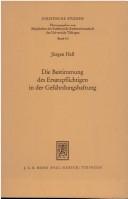| Listing 1 - 10 of 30 | << page >> |
Sort by
|
Book
ISBN: 1509920269 1509920242 1509920250 9781509920266 9781509920242 9781509920259 Year: 2019 Publisher: London : Bloomsbury Publishing,
Abstract | Keywords | Export | Availability | Bookmark
 Loading...
Loading...Choose an application
- Reference Manager
- EndNote
- RefWorks (Direct export to RefWorks)
"The scope of vicarious liability has significantly expanded since its original conception. Today employers are being found liable for actions of employees that they did not authorise, and never would have authorised if asked. They are being held liable for an employee's criminal activity. In the related strict liability field of non-delegable duties, they are being held liable for wrongdoing of independent contractors. Notions of strict liability have grown increasingly isolated in the law of tort, given the exponential growth in the tort of negligence. They require intellectual justification. Such a justification has proven to be elusive and largely unsatisfactory in relation to vicarious liability and to concepts of non-delegable duty. The law of three jurisdictions studied has now apparently embraced the 'enterprise risk' theory to rationalise the imposition of vicarious liability. This book subjects this theory to strong critique by arguing that it has many weaknesses, which the courts should acknowledge. It suggests that a rationalisation of the liability of an employer for the actions of an employee lies in more traditional legal doctrine which would serve to narrow the circumstances in which an employer is legally liable for a wrong committed by an employee."--Bloomsbury Publishing.
Book
Year: 1897 Publisher: Bordeaux : Impr. du Midi,
Abstract | Keywords | Export | Availability | Bookmark
 Loading...
Loading...Choose an application
- Reference Manager
- EndNote
- RefWorks (Direct export to RefWorks)

ISBN: 3166411518 Year: 1978 Publisher: Tübingen : Mohr,
Abstract | Keywords | Export | Availability | Bookmark
 Loading...
Loading...Choose an application
- Reference Manager
- EndNote
- RefWorks (Direct export to RefWorks)
Respondeat superior --- Strict liability --- Torts
Book
ISBN: 9781509917532 Year: 2019 Publisher: Oxford ; New York : Hart,
Abstract | Keywords | Export | Availability | Bookmark
 Loading...
Loading...Choose an application
- Reference Manager
- EndNote
- RefWorks (Direct export to RefWorks)
"This book adopts a novel approach to resolving the present difficulties experienced by the courts in imposing strict liability for the tort of another. It looks beyond the traditional classifications of 'vicarious liability' and 'liability for breach of a non-delegable duty of care' and for the first time seeks to explain all instances of strict liability for the tort of another in terms of the various relationships in which the courts impose such liability. The book shows that, despite appearances, there is a unifying feature to the various relationships in which the courts currently impose strict liability for the tort of another. That feature is authority. Whenever the courts impose strict liability for the tort of another, the defendant is either vested with authority over the person who committed a tort against the claimant or has vested or conferred a form of authority upon that person in respect of the claimant. This book uses this feature of authority to construct a new expositive framework within which strict liability for the tort of another can be understood"--
Respondeat superior --- Strict liability --- Torts
Book
Year: 1960 Volume: 20 Publisher: Paris : Librairie générale de droit et de jurisprudence,
Abstract | Keywords | Export | Availability | Bookmark
 Loading...
Loading...Choose an application
- Reference Manager
- EndNote
- RefWorks (Direct export to RefWorks)
Book
ISBN: 9780199670819 0199670811 Year: 2012 Publisher: Oxford, U.K. : Oxford University Press,
Abstract | Keywords | Export | Availability | Bookmark
 Loading...
Loading...Choose an application
- Reference Manager
- EndNote
- RefWorks (Direct export to RefWorks)
International crimes. --- Respondeat superior. --- International criminal law.
Book
ISBN: 3631380216 Year: 2001 Publisher: Frankfurt Lang
Abstract | Keywords | Export | Availability | Bookmark
 Loading...
Loading...Choose an application
- Reference Manager
- EndNote
- RefWorks (Direct export to RefWorks)
Liability (Law) --- Respondeat superior --- Third parties (Law)
Book
ISBN: 9780191649820 0191649821 9780199670819 0199670811 Year: 2012 Publisher: Oxford, U.K. : Oxford University Press,
Abstract | Keywords | Export | Availability | Bookmark
 Loading...
Loading...Choose an application
- Reference Manager
- EndNote
- RefWorks (Direct export to RefWorks)
A republication of this highly significant work of 1965, this book addresses the defence of superior orders in the context of national and international law, providing a detailed analysis that remains relevant. With a new preface by the author, this book is an accessible text for scholars and practitioners of international criminal law.
International crimes. --- Respondeat superior. --- International criminal law.
Book
ISBN: 2130358160 9782130358169 Year: 1978 Volume: 5 Publisher: Paris: PUF,
Abstract | Keywords | Export | Availability | Bookmark
 Loading...
Loading...Choose an application
- Reference Manager
- EndNote
- RefWorks (Direct export to RefWorks)
Torts --- Criminal intent --- Respondeat superior --- Torts - France --- Criminal intent - France --- Respondeat superior - France
Book
ISBN: 9783214039950 3214039954 Year: 1992 Publisher: Wien: Manz,
Abstract | Keywords | Export | Availability | Bookmark
 Loading...
Loading...Choose an application
- Reference Manager
- EndNote
- RefWorks (Direct export to RefWorks)
Master and servant --- Respondeat superior --- Third parties (Law)
| Listing 1 - 10 of 30 | << page >> |
Sort by
|

 Search
Search Feedback
Feedback About UniCat
About UniCat  Help
Help News
News